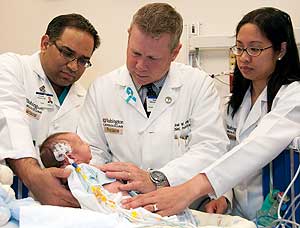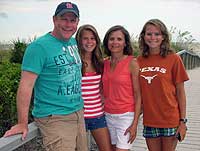When Brad Warner, M.D., arrived in 2007 as the new pediatric surgeon-in-chief at the School of Medicine and St. Louis Children’s Hospital, it was a homecoming of sorts.

He grew up in University City and, as a teenager, volunteered in the emergency room and clinics of Jewish Hospital. It was there that a surgical resident took Warner under his wing, inviting him into the operating room to observe surgeries.
“That experience was like a spark around dynamite for me,” he says.
Warner’s return to St. Louis after more than two decades at the University of Cincinnati Medical Center and Cincinnati Children’s Hospital Medical Center has created a similar spark, reenergizing the pediatric surgery program. He has hired three additional pediatric surgeons, placed a renewed emphasis on research and transformed the pediatric surgery rotation into one that is highly ranked by medical students and residents. Along the way, Warner has earned high praise for his compassionate care to young patients and their families.
“He’s spectacular,” says Timothy Eberlein, M.D., the Bixby Professor and chairman of the Department of Surgery. “Every facet of the job Brad has touched has changed for the better. He’s a superb mentor and role model for the students and residents. Many times I wonder how any one human being can do all the things that he does and do them so well. He’s made a huge impact on our pediatric surgery program.”
Warm and engaging, Warner is widely regarded for his clinical expertise in pediatric cancer surgery and surgical procedures for inflammatory bowel disease and other gastrointestinal illnesses. He was attracted to the medical center’s rich academic environment, with its top-ranked medical school, children’s hospital and surgery department, all on the same campus.
“This environment has all the elements to produce the finest pediatric surgery program in the country,” he says.
Compassion for kids
Even as a preschooler, Warner knew he wanted to be a surgeon. Without patients on which to practice, he hauled home dead animals to dissect, much to his mother’s dismay. She was a nurse at St. Luke’s Hospital, and her stories about intriguing cases fed her son’s interest in medicine.

Warner earned a medical degree from the University of Missouri-Kansas City School of Medicine. He completed his surgical residency at the University of Cincinnati under then-surgery department chairman Josef Fischer, M.D.
“He was a rigid, Harvard-trained, academic surgeon,” Warner says. “His focus was on patient care, but he made you feel like you weren’t giving back if you just did patient care. He really pushed me and others to do research so that we could improve patients’ care.”
During his surgical residency, Warner found himself especially moved by the children he met in the pediatric rotation.
“Children are very resilient,” he says. “They really do want to be better. When I see a child who has had open-heart surgery sitting up in bed the next day licking a popsicle and ready to go back at it — well, it’s nothing short of amazing. They have such a positive outlook.”
One child, in particular, changed the course of Warner’s career. During his fellowship, Warner cared for a young boy with short-bowel syndrome, whose abbreviated intestines couldn’t absorb nutrients normally. He came into the clinic wearing a backpack that held a battery-operated feeding pump so he could receive nutrition via a vein.
“The boy was jaundiced from liver failure, and his mother was teary-eyed from seeing her son suffer,” Warner says. “He was so small for his age and tried so hard to do the things a normal four-year-old would do.”
Warner decided then to focus his research on short-bowel syndrome. Although some children are born with shortened intestines, the condition is more commonly caused by necrotizing enterocolitis, a gastrointestinal illness that primarily affects premature infants. The infection and inflammation that are hallmarks of the condition spread quickly, destroying part or all of the intestines.
“The babies will be feeding well and growing, then all of a sudden, their abdomen becomes distended or they pass blood,” Warner says. “In the operating room, we sometimes see that there just is no bowel left. In these cases, there is nothing we can do. It is a heartbreaker for everyone.”
Most of the time, however, surgeons can remove the diseased bowel and sew the healthy parts back together. Interestingly, when a portion of the intestine is surgically removed, the intestine that remains senses this loss and tries to compensate by growing back, a process called adaption.
Warner is investigating this phenomenon in his laboratory.
“If we can understand the adaption response better, eventually we may be able to give patients growth factors or other agents to encourage their bowel to grow back after surgery,” he says.
A good team
|
Brad Warner |
|
Education: M.D., University of Missouri-Kansas City School of Medicine Titles: Pediatric surgeon-in-chief at the School of Medicine and St. Louis Children’s Hospital, and the Apolline Blair St. Louis Children’s Hospital Professor of Surgery Family: Barbara Warner, M.D., associate professor of pediatrics and a neonatologist at St. Louis Children’s Hospital; daughters Lauren, 17, a senior at Mary Institute Country Day School who will attend Washington University in the fall, and Emily, 14, a freshman at Ladue Horton Watkins High School Hobbies: Landscape and portrait photography and running marathons. He is training to run the San Diego Marathon with daughter Lauren in May. |
Warner’s wife, Barbara Warner, M.D., associate professor of pediatrics and a neonatologist at St. Louis Children’s Hospital, also was recruited to the medical school at the same time. The two met while he was a resident and she a medical student. In addition to caring for many of the same patients, they also have a long-running research collaboration that centers on necrotizing enterocolitis.
While the causes of the illness are unknown, the Warners have long suspected that it may be linked to an underlying injury or abnormality in the intestinal lining, which may influence the composition of the microbes that naturally colonize the gut after birth.
Their partnership has explored the critical role of epidermal growth factor in necrotizing enterocolitis. Mice pups that lack the growth factor die soon after birth from a bowel infection that closely mirrors the human illness. The Warners have shown levels of the growth factor are high in breast milk but not in formula. Interestingly, premature babies who are formula-fed have a higher risk of necrotizing enterocolitis than those who are breast-fed. The pair also has found lower levels of the growth factor in babies with the condition.
Brad Warner also specializes in the care of babies born with congenital diaphragmatic hernia, which affects one in every 2,000 U.S.-born babies. The condition occurs when the diaphragm does not fully develop, allowing abdominal organs to grow into the chest cavity. This crowds out the developing lungs and prevents them from growing normally. Most babies born with the condition must be placed on a heart-lung bypass machine because their weakened lungs can’t provide enough oxygen to the body. Nearly half of these babies die before they reach their first birthday.
Two families whose babies recently died of the condition at St. Louis Children’s Hospital have joined together to raise funds that support research into new treatments by Warner and others in the division of pediatric surgery.
“Caring for these two babies was a very memorable experience for me because I feel we offered everything possible for them, and it just didn’t work,” he says.
“Dr. Warner is an extraordinary colleague and a tireless advocate for his patients and their families,” says F. Sessions Cole, M.D., the Park J. White, M.D., Professor of Pediatrics and assistant vice chancellor for children’s health. “Despite his busy clinical, educational, research and administrative responsibilities, he is always available for his patients and their families. His standard of supportive professionalism enhances all of our practices.”
Since his arrival, Warner has placed a high priority on strengthening the pediatric surgery training programs. Medical students now rotate through the program, and the program for residents has proven so popular that nine are planning careers in pediatric surgery.
“To me, this is especially gratifying,” Warner says.
Warner is highly admired not only by those in St. Louis but by former colleagues in Cincinnati for his generosity of ideas, unquestionable integrity and balance of professional and family life.
“His career serves as a superior example to students, residents and fellows of commitment to superb patient care, cutting-edge research and education,” says Frederick C. Ryckman, M.D., professor of surgery/transplantation at Cincinnati Children’s Hospital Medical Center. “He has achieved all these professional goals while being hopelessly in love with his wife, Barb, and continuously bewitched by his two beautiful daughters. He is all that so many of us aspire to become.”